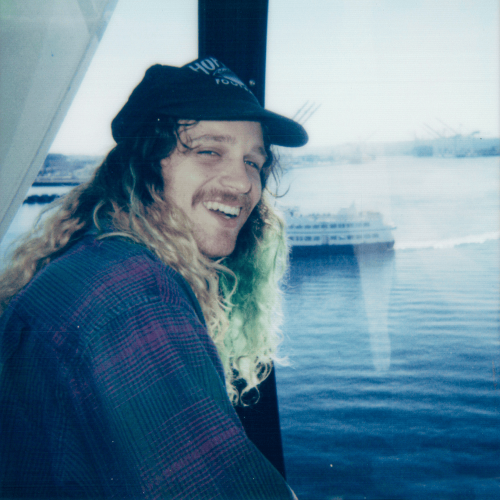Transformation, like birth, is disorienting and scary.
You think you’re in one place with everything all sorted out, and then suddenly you’re at square one, or square negative-a-million as it sometimes feels, with no idea where you are or what the heck you’re supposed to do.
Briston Maroney’s “Skydiver” is a musical tribute to this feeling, optimistic even in the vertigo of free-fall.
The song opens with a muted drum rhythm and played-back-backwards (I think) guitar. A stray acoustic guitar note sounds as the opening builds, sort of like a mistake on purpose, and then a beat or so later the big, reverby electric guitar announces the chord progression. A driving, medium-tempo drum beat fills in the space between the chords, which pass like clouds, while a gauzy, almost banjo-ey acoustic line shimmers on high.
I suppose it’s too easy or too obvious, but it feels like a plane at cruising altitude, right when the pilot turns off the fasten-your-seatbelt sign and the views are crystal clear.
The voice dives right in, angelic and androgynous, declaring:
Like I always knew you would
The days just pass me by
Maroney’s singer-protagonist is articulating that almost-nostalgic feeling for lost time, except it’s more inert than even nostalgia. The actual act of looking back is absent, but the sense of stasis and loss induces something like a trance, which can be its own feedback loop, staunching motion before it begins. It’s like that feeling you get before jumping into the pool for your first summer swim because you know that water’s going to be cold, so you sort of linger, psyching yourself up.
It’s also, as the singer would have it,
Like a bird without a song
Skydiver with no sky
We perhaps long to meld being with purpose, even though that might not always work or even be desirable. If you’re sweeping the floor, how much do you want to be considered a sweeper? If you lack cleaning supplies and have an embarrassing amount of dust on the floor, do you become a sweeper without a broom?
But Maroney’s singer is not singing about functional being but essential being—the sense that each of us is someone unique with a unique contribution to make. Whether this is mere sentimentality or an existential conundrum, most of us have wondered at one time or another, just what is it I’m supposed to be doing on this earth (or up above it, as the case may be)? It’s an important question to ask because without it, we tend to just listlessly do whatever someone else expects of us, and we start to give off that gloomy perpetual teenager vibe.
This is where change and perspective can be so vital:
Never thought I’d see the sun
From quite this point of view
Nothing like being airborne to give that blazing orb another kind of light.
And maybe the next time it rises, you’ll be a new you.
But change, real change, is scarier than jumping from a plane. As the song’s pre-chorus puts it:
All that I can be is what I’ve not quite been yet
Wasn’t I to do without a perfect cue?
Reeling in the fear like I’m not quite human
A disorienting dilemma offers no “perfect cue,” and keeping fear in check can feel like it requires a superhuman effort, to the point of being “not quite human.” The play on “reeling” is just right because it evokes feeling stuck and spinning in the fear, and reeling it in to control it.
The chorus is beautifully split as “sky” and “diver.” After the relative density of lyrics in the pre-chorus and its rising tension—I envision that skydiver standing in the open biplane door, looking down at the plunge ahead—we get the release of a single word in space, lilting upward as “sky” and back down as “diver.” The construction of the song allows for triumph here, a sense that all this confusion and struggle will be worth it.
And indeed the singer emerges into something new:
Like a dream I never had
From a broken breath I drew
It seems often to be the case that when a dream comes true, it doesn’t resemble the dream at all. How could it? Dreams make lousy maps, but they do come true sometimes. And when they do, it tends not to be because of the sweat or the self-help books, or it doesn’t feel like it. It feels like fate, like an impossibility, like “standing on the sun.”
And maybe that’s why the singer closes the second verse with “living just to die.” In a different context, this could seem like a downer, but here it signals acceptance. It’s what happens after you finally dive into the pool on the hot summer day and the shock of the cold water wears off: you swim just to swim until you get out of the pool.







